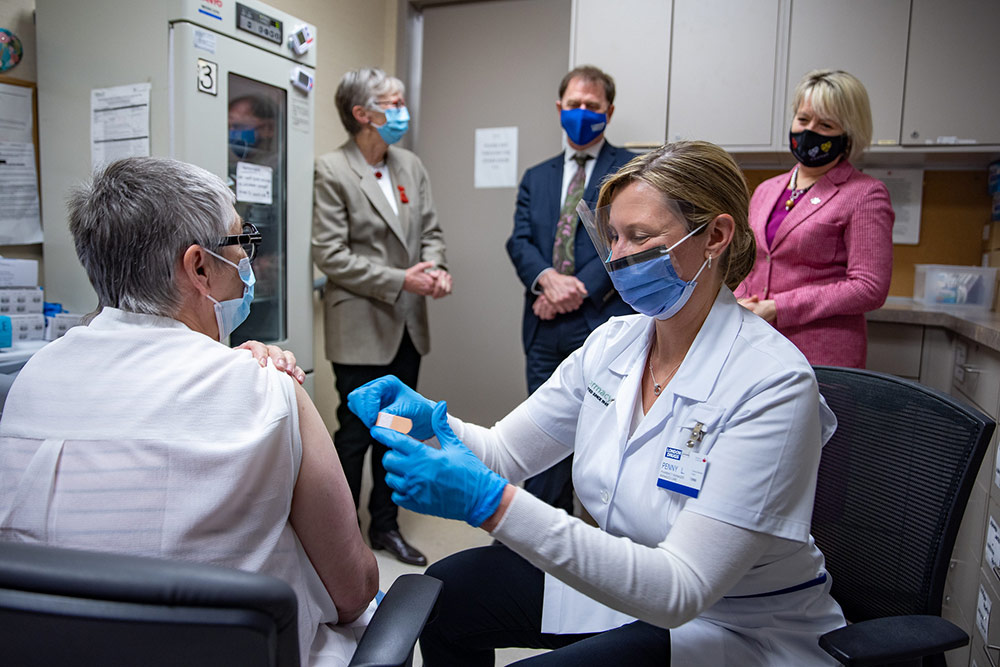British Columbia could face a surge in COVID-19 cases that will overwhelm hospitals in the next month if the Omicron variant takes hold, according to new provincial modelling.
But the province isn’t providing rapid tests to the public or placing limits on holiday gatherings to prevent what experts say is a “significant risk” for a fifth Omicron-driven pandemic wave amid loosened public health restrictions.
“We need to be thoughtful about how we approach these holidays and, more than ever, be prudent,” said provincial health officer Dr. Bonnie Henry Tuesday.
She asked British Columbians to “rethink” large holiday gatherings and limit them to only close friends and family who are vaccinated.
But Henry said current limits on gatherings won’t be tightened.
Early evidence indicates the Omicron variant is more transmissible than the Delta variant and evades protection from vaccines more easily, Henry said.
B.C. is collecting its own data and looking at what is happening in the United Kingdom and South Africa for answers as it considers moving up booster shots which are currently offered six months after an individual’s second dose.
“We know there’s a lot of uncertainty, still, about Omicron,” Henry said.
In the worst case scenario the province modelled, daily cases could top 2,000 and hospitalizations reach nearly 100 per day by mid-January.
“A rapid rise in cases will inevitably increase the number of severe cases, especially among the unvaccinated, and will impact the medical care system,” read a Dec. 8 report from the independent BC COVID-19 Modelling Group, a collective of academics and experts in disease modelling and epidemiology who provide analysis of B.C.’s pandemic situation.
B.C.’s first case of Omicron was identified on Nov. 30. By Sunday, health officials had identified 44 cases of the Omicron variant up to Dec. 12, none of whom are in hospital.
Of those, seven are not fully vaccinated and 24 had not recently travelled, meaning there is already spread in the community, including at least four cases linked to an outbreak at the University of Victoria.
“It may take many weeks before adequate data is compiled to estimate these risks and distinguish between vaccinated versus unvaccinated people, different age groups and co-morbidities,” said the independent modelling group.
When asked about further restrictions to slow the spread of the variant until more is known, Henry said she would not be tightening rules.
Henry also declined to provide free rapid tests to the public, as provinces like Alberta, Quebec and Ontario have said they will in recent days.
B.C. has approximately two million unused rapid antigen tests, which detect positive cases about 90 per cent of the time when someone is in their most infectious period.
Henry downplayed the efficacy of rapid tests, which both the modelling group and independent doctors group Protect Our Province BC have called for her to release.
In B.C., the eight per cent of eligible yet unvaccinated individuals make up 54 per cent of COVID cases, 68 per cent of hospitalizations and 72 per cent of patients in intensive care.
Someone who is unvaccinated is seven times as likely to be infected, 30 times as likely to be hospitalized and 50 times more at risk of needing intensive care than someone their same age who is fully vaccinated.
Evidence indicates that vaccines are still highly effective against Omicron, although their efficacy is slightly reduced compared to the Delta and Beta strains that have been previously dominant in B.C.
Henry and Health Minister Adrian Dix continued to stress the importance of getting vaccinated to protect individuals and communities, and to get one’s booster as soon as it is offered.
“We need to hold the line, we need to continue to do those things that we know work,” said Henry. ![]()
Read more: Coronavirus, BC Politics

















Tyee Commenting Guidelines
Comments that violate guidelines risk being deleted, and violations may result in a temporary or permanent user ban. Maintain the spirit of good conversation to stay in the discussion.
*Please note The Tyee is not a forum for spreading misinformation about COVID-19, denying its existence or minimizing its risk to public health.
Do:
Do not: